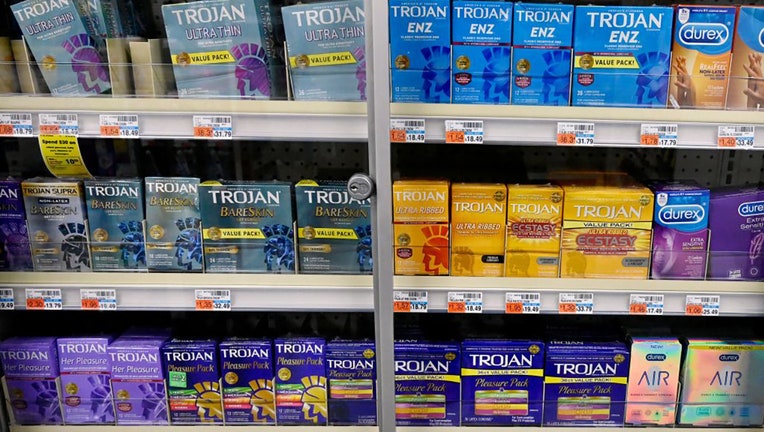Biden administration proposes making over-the-counter birth control free, including condoms

FILE - Packs of various condoms stand on a shelf of a store in Washington, DC, on Feb. 23, 2022. (Photo by OLIVIER DOULIERY/AFP via Getty Images)
WASHINGTON - Those with private health insurance would be able to get free over-the-counter methods of birth control, including condoms, the "morning after" pill, and daily oral contraceptives under a newly-proposed rule announced by the White House.
Currently, private health insurance must cover the cost of prescribed contraception, including prescription birth control or condoms that doctors have issued a prescription for. The new rule, announced on Monday, would expand coverage and allow millions of people to get free condoms, birth control pills, or "morning after" pills from local stores without a prescription.
The proposal comes almost two weeks before Election Day, with Vice President Kamala Harris promising to expand women’s health care access as part of her presidential campaign following the U.S. Supreme Court’s overturning of Roe v. Wade – the constitutional right to abortion.
2 years since Roe v. Wade overturned
Today marks 2 years since the U.S. Supreme Court overturned Roe v. Wade, the decision whether to continue or end a pregnancy belongs to the individual, not the government. Audrey Blondin joins Jeane Franseen to discuss the significance of the overturning, and the future of abortion rights in the United States.
Former President Donald Trump appointed some of the justices who issued the ruling, and Harris has sought to paint a distinct contrast from her Republican challenger in the race.
"President Biden and I stand with the majority of Americans – Republicans and Democrats alike – who support access to contraception," Harris said in a statement about the rule. "And we continue to call on Congress to pass federal legislation that restores reproductive freedom nationwide."
Trump, for his part, said he "has never and will never" advocate for restricting birth control and other contraceptives after seeming to suggest the idea in an interview earlier this year.
Free OTC birth control: How would it work?
Emergency contraceptives that people on private insurance would be able to access without costs include levonorgestrel, a pill more commonly known by the brand name "Plan B" that needs to be taken immediately after sex to prevent pregnancy.
Without a doctor's prescription, women may pay as much as $50 for a pack of the pills. Additionally, women who delay buying the medication in order to get a doctor's prescription could jeopardize the pill's effectiveness, since it is most likely to prevent a pregnancy within 72 hours after sex.
If implemented, the new rule would also require insurers to fully cover the once-a-day Opill, a new over-the-counter birth control pill that the U.S. Food and Drug Administration approved last year. A one-month supply of the pills costs $20.
Federal mandates for private health insurance to cover contraceptive care were first introduced with the Affordable Care Act, which required plans to pick up the cost of FDA-approved birth control that had been prescribed by a doctor as a preventative service.
In a statement, the White House called the proposed rule "the most significant expansion of contraception coverage under the Affordable Care Act since 2012" if it is finalized.
The proposed rule would not impact those on Medicaid, the insurance program for the poorest Americans. States are largely left to design their own rules around Medicaid coverage for contraception, and few cover over-the-counter methods like Plan B or condoms.
The proposed rule will undergo a comment period, and if approved, it likely wouldn’t go into effect until 2025 and could change depending on the outcome of the 2024 presidential election.

